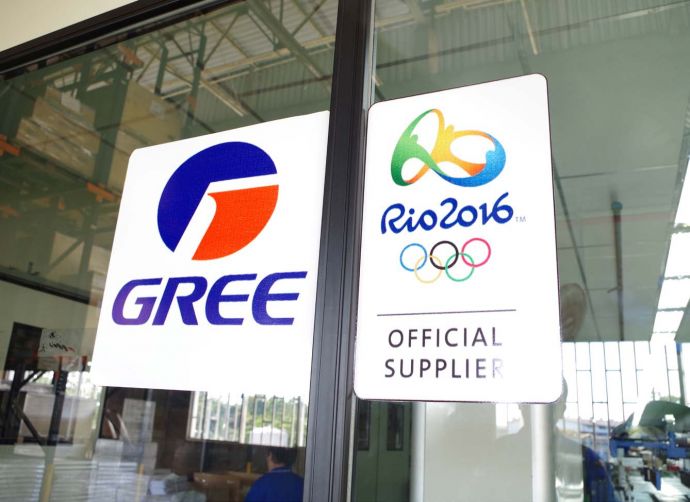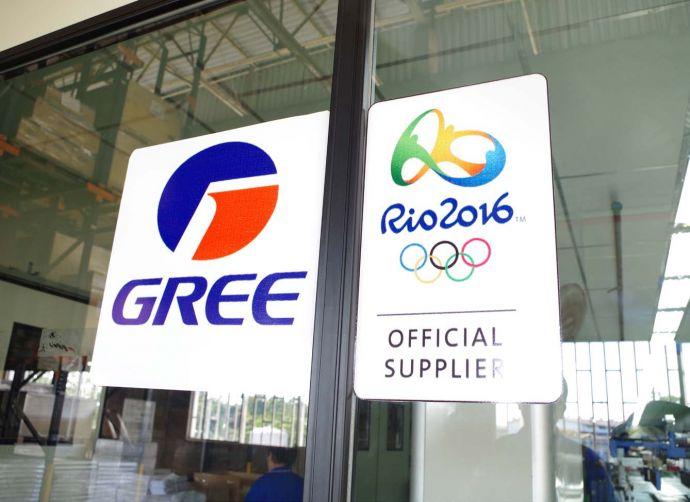
Gree becomes an official supplier of Rio Olympic Games. (Photo taken in May 2016 by Gree Electric Appliances (Brazil) Co., Ltd.)
BEIJING, Nov.27 (Xinhua) -- On the most popular consumer review website in Brazil, there is a big smile sign under Gree’s company logo. Gree, a Chinese enterprise, has become the best rated enterprise in the air conditioning industry in Brazil, or a “big smile” company, due to low comsumer complaint rates and highly efficient after-sales service.
Gree invested in a factory in the Brazilian city Manaus as an explorer 17 years ago, becoming the first Chinese enterprise to enter the Brazilian market. Now,17 years later, Gree has exerperienced tremendous success in Brazil and is still going strong.
“For enterprises, the most important is not becoming the ‘pig’ at the eye of a storm, but prioritizing resilience and stability,” said Wang Weizhen, deputy general manager of Gree Brazil. “Gree is able to remain invincible in Brazil exactly because of Gree Brazil’s consistent demand of top brand, technologies and services for more than a decade.”
The Manaus Free Trade Zone, however, is swarming with international air conditioner brands and offers staunch competition. Around 90 percent of all air conditioner components and parts found in Manaus are imported from China and then assembled into different brands of international air conditioners. Gree is one of few Chinese owned air conditioner enterprises left in the Manaus Free Trade Zone. The continued success of Gree despite international competition,defends the honor and quality of Chinese brands.
Brand building combined with technological dedication has allowed Gree to transform itself from a small scale factory on Jijin West Road in Zhuhai city 26 years ago to a famous Chinese brand with more than 70 thousand employees and its own products being sold in 160 countries and regions. This transformation is exceptional considering that Gree began with an annual production value of less than 300 million yuan and an annual output capacity of less than 20 thousand units.
Symoblizing Gree’s industry power, in the summer of 2016, Gree’s name and logo were prominently displayed on display boards advertising official partners of the Rio Olympics. In the stadiums and other venues of the Rio Olympics,Gree was placed alongside international conglomerates such as MacDonald’s and Sumsang. Moreover, Gree, as an official supplier, was cast in the same league as companies such as Microsoft and Nike. Gree’s status at the Olympics was also notable as it was one of only two Chinese enterprises to be an official partner of the Rio Olympics.
To ensure the success of Gree during the Olympics, the company deployed a dedicated team to various stadiums of the Rio Olympics and also to the Olympic Village. “I had only one thought, which was the brand of Gree must not be stained in the Rio Olympics,” said Wang Weizhen, “At the end, there was zero complaint against Gree products during the whole Olympics.”
Now, in the past 17 years since Gree entered the Brazilian market, Gree has overcome uncertainties of regulations, customs and national circumstances and tapped into the attractive market. Wang Weizhen explained, “Every breakthrough is like a big adventure here in Rio. Upholding Gree’s highest standards on quality and technologies enable Gree Electronic Appliances to achieve its ‘dominating position’ in Brazil today.”
In Brazil, Gree has been the “first person to try tomato” time and again,introducing the latest technologies and products to the Brazilian market.Xie Dongbo, general manager of Gree Brazil said, “We introduced the first ever production line for split air conditioners in Brazil, changing the market situation in Brazil which had been dominated by window units before that and improving the energy efficiency of air conditioners. We introduced the first high energy efficiency inverter air conditioners into the Brazilian market.”
He continued, “we have also contributed greatly to the environmental protection of Brazil. Since 2004, we have been granted the highest energy saving certificate by the government of Brazil every year. Now we are planning to introduce the latest photovoltaic air conditioners into Brazil.”
After more than a decade of hard work, Gree has now risen to become the leading enterprise in the air conditioning industry in Brazil. This is in part due to Gree having built a distribution network covering all of Brazil with more than 300 distributors and more than 500 sales and service outlets.
In Brazil, Gree practices localized operation. “In Gree’s Brazilian offices, the proportion of Chinese employees is strictly limited within 5 percent. Relying predominantly on Brazilian employees has helped us achieve great management results,” said Wang Weizhen.
Gree is an important taxpayer in the Manaus Free Trade Zone. Since its Brazilian base was put into operation 17 years ago, Gree has contributed approximately 1.5 billion Brazilian real (1 U. S. dollar is roughly 3.1 Brazilian real) to Brazil in taxation, salaries and employment.
Besides direct contribution to Brazilian taxation and employment, Gree also brings Chinese “warmth” to Brazilian people with its charitable activities. In 2012, after seeing that senior citizens in the Dom Bosco Old People’s Home in the city of Itaja were suffering from sweltering heat in summers and freezing cold in winters, Gree Brazil decided to donate many units of high energy efficiency cooling and heating equipment, with a total value of approximately 17 thousand U. S. dollars. Furthermore, the company signed a long-term aid agreement with the old people’s home.
Li Haitong, the Counselor of Economy and Commerce at China’s Consulate General in Sao Paolo said that since Gree’s entrance into the Brazilian market,the company has not only shown its dedication to providing high quality products and services to local consumers, but also has been working hard to promote Sino-Brazilian social and cultural exchange at a deeper level, an effort lauded by all in the industry.
Gree’s Brazilian experience over the past 17 years is a story of both innovation and persistence and the possibility of striking a balance between the two and demonstrating the unique wisdom of Chinese enterprises. (Reporter: Lv Guangyi)




 A single purchase
A single purchase









